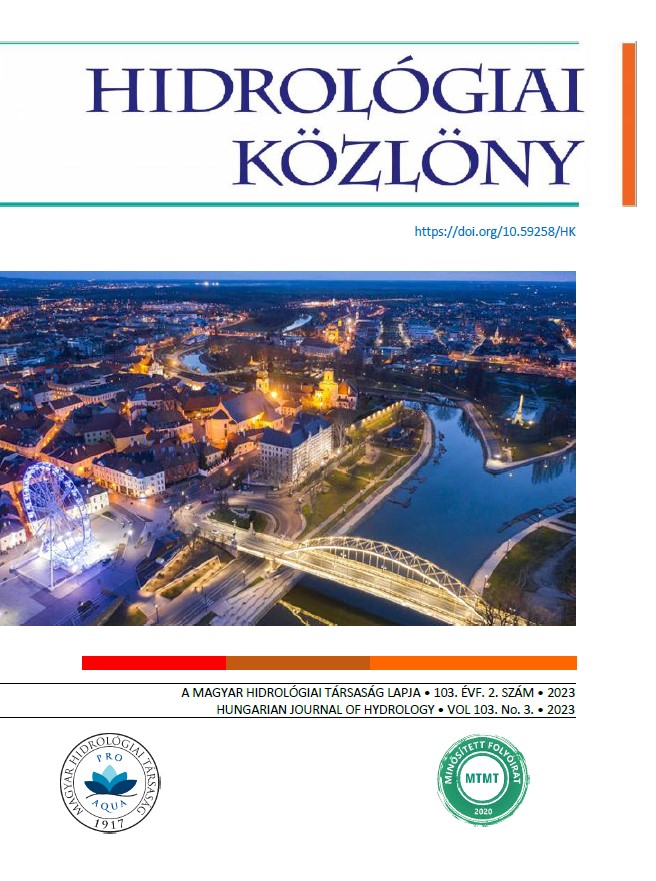Event-based rainfall-runoff modelling using precipitation data from various sources
Abstract
In the case of rainfall-runoff modelling, the quality of the applied input data is an essential factor, especially concerning the precipitation time series. Nowadays, many databases are available, but their quality and applicability might differ significantly. The research has two main aims: to examine the suitability of different precipitation data sources in the case of rainfall-runoff modelling of medium-sized watersheds and to examine the applicability of physical parameters of the soil using a free online map stock. The catchment delineation was performed using ArcGIS and HEC-GeoHMS while the rainfall-runoff models were built in HEC-HMS software. These models are deterministic, event-based and lumped. The modelled events – nine for each watershed – occurred between 2009 and 2016 in the study area. Gauging station, reanalysis, and satellite data were used in the model. The model was calibrated and validated for runoff quantities, the shape of the hydrograph and the time of the peak discharge. Based on the results, the different data sources were compared in detail based on the aspects of manageability, resolution, the standard deviation of runoff rates, and the difficulty of calibration. After summarizing the results, it can be seen that without weighting the examined aspects the satellite data proved to be the most suitable. It can also be stated that the applied soil data can be used for modelling, however, the parameters require calibration
References
AghaKouchak, A., Behrangi, A., Sorooshian, S., Hsu, K., Amitai, E. (2011). Evaluation of Satellite-Retrieved Extreme Precipitation Rates Across the Central United States. Journal of Geophysical Research. p. 116. https://doi.org/10.1029/2010JD014741
AGROTOPO, https://www.mta-taki.hu/hu/osztalyok/kornyezetinformatikai-osztaly/agrotopo
Beven, K. (2012). Rainfall-Runoff Modelling. The Primer. Second Edition. John Wiley & Sons, Ltd. https://doi.org/10.1002/9781119951001
Biggs, E., Atkinson, P. (2011). A comparison of gauge and radar precipitation data for simulating an extreme hydrological event in the Severn Uplands, UK. Hydrological Processes. 25. pp. 795-810. https://doi.org/10.1002/hyp.7869
Copernicus Climate Change Service (C3S) (2019). C3S ERA5-Land reanalysis . Copernicus Climate Change Service, 15/09/2019. https://cds.climate.copernicus.eu/cdsapp#!/home (Letöltve: 2019.09.18.)
CORINE Land Cover-Copernicus (2019). https://land.copernicus.eu/pan-european/corine-land-cover (Letöltve: 2019.10.25.)
Donovál K., Lévai D. (2013). Telítetlen talajparaméterek pontos meghatározása. TDK dolgozat. Budapesti Műszaki és Gazdaságtudományi Egyetem.
Dybro Thomassen, E., Thorndahl, S., Andersen, C, Gregersen, I., Arnbjerg-Nielsen, K., Sørup, H. (2022). Comparing spatial metrics of extreme precipitation between data from rain gauges, weather radar and high-resolution climate model re-analyses. Journal of Hydrology. 610. 127915. https://doi.org/10.1016/j.jhydrol.2022.127915
Feldman, A. D. (2000). Hydrologic Modeling System HEC-HMS Technical Reference Manual, Washington. pp. 39-40.
Fraga, H., Pinto, J.G., Santos J.A. (2020). Olive tree irrigation as a climate change adaptation measure in Alentejo, Portugal, Agricultural Water Management. https://doi.org/10.1016/j.agwat.2020.106193
Freeze, R.A., Cherry, J.A.,(1979). Groundwater Prentice-Hall, New Jersey
Hegedüs, P., Czigány, Sz., Balatonyi, L., Pirkhoffer, E. (2013). Analysis of soil boundary conditions of flash floods in a small basin in SW Hungary. Central European Journal of Geosciences. 5. https://doi.org/10.2478/s13533-012-0119-6
Kozma Zs., Decsi B., Manninger M., Móricz N., Makó A., Szabó B. (2019). Becsült talajhidrológiai paraméterek szimulációs vizsgálata a NAIK Erdészeti Tudományos Intézet két mintaterületén, Agrokémia és Talajtan 68. pp. 13-36. https://doi.org/10.1556/0088.2019.00031
McMillan, H., Jackson, B., Clark, M., Kavetski, D., Woods, R. (2011). Rainfall uncertainty in hydrological modelling: An evaluation of multiplicative error models. Journal of Hydrology, 400(1-2). pp. 83-94. https://doi.org/10.1016/j.jhydrol.2011.01.026
Moges, D.M., Kmoch, A., Uuemaa, E. (2022). Application of satellite and reanalysis precipitation products for hydrological modeling in the data-scarce Porijõgi catchment, Estonia. Journal of Hydrology: Regional Studies. 41. https://doi.org/10.1016/j.ejrh.2022.101070
NASA Global Precipitation Measurement, Data Downloads (2020). https://gpm.nasa.gov/data-access/downloads/gpm?fbclid=IwAR0oOOb-DtoxfAX1iz9obpKq9mgTW5_L8dIfZu-la7GsRqZ1a9I700T20Go (Letöltve: 2020.05.20.)
Nash, J.E., Sutcliffe, J.V. (1970). River flow forecasting through conceptual models part I – A discussion of principles, Journey of Hydrology. https://doi.org/10.1016/0022-1694(70)90255-6
Négyesi K. (2020). Különböző típusú csapadékadatok használatának összehasonlító elemzése. BSc diplomamunka. Budapesti Műszaki és Gazdaságtudományi Egyetem.
Négyesi K., Nagy E. D. (2022). Analyzing the connection between rainfall intensities and times of concentration using rainfall-runoff modeling. Hydro-Carpath-2022, Hydrology Of The Carpathian Basin: Synthesis Of Data, Driving Factors And Processes Across Scales: Abstracts and Posters of the Conference. https://doi.org/10.35511/978-963-334-452-1
Niemi, T., Warsta, L., Taka, M., Hickman, B., Pulkkinen, S., Krebs, G., Moisseev, D., Koivusalo, H., Kokkonen, T. (2017). Applicability of open rainfall data to event-scale urban rainfall-runoff modelling. Journal of Hydrology. 547. pp. 143-155. https://doi.org/10.1016/j.jhydrol.2017.01.056
Országos Meteorológiai Szolgálat (2019) csapadékadat szolgáltatás.
Price, K., Purucker, S., Kraemer, S., Babendreier, J., Knightes, C. (2014). Comparison of radar and gauge precipitation data in watershed models across varying spatial and temporal scales. Hydrological Processes. 28. https://doi.org/10.1002/hyp.9890
Reis, A., Weerts, A., Ramos, M., Wetterhall, F., Fernandes, W. (2022). Hydrological data and modeling to combine and validate precipitation datasets relevant to hydrological applications. Journal of Hydrology: Regional Studies. 44. 101200. https://doi.org/10.1016/j.ejrh.2022.101200
Szilagyi, J. (2007). Analysis of the nonlinearity in the hillslope runoff response to precipitation through numerical modeling. Journal of Hydrology. 337(3-4), pp. 391-401. https://doi.org/10.1016/j.jhydrol.2007.02.005
Tóth, B., Weynants, M., Pásztor, L., Hengl, T. (2017). 3D Soil Hydraulic Database of Europe at 250 m resolution, Hydrol. Process., https://doi.org/10.1002/hyp.11203
Yang, C., Fraga, H., van Ieperen, W., Trindade, H. (2019). Effects of climate change and adaptation options on winter wheat yield under rainfed Mediterranean conditions in southern Portugal, Climatic Change 154. pp. 159-178. https://doi.org/10.1007/s10584-019-02419-4
Yang, C., Fraga, H., van Ieperen, W., Santos J. A. (2020). Assessing the impacts of recent-past climatic constraints on potential wheat yield and adaptation options under Mediterranean climate in southern Portugal, Agricultural Systems. https://doi.org/10.1016/j.agsy.2020.102844
Copyright (c) 2023 Klaudia Négyesi, Eszter Dóra Nagy

This work is licensed under a Creative Commons Attribution-NonCommercial-ShareAlike 4.0 International License.




